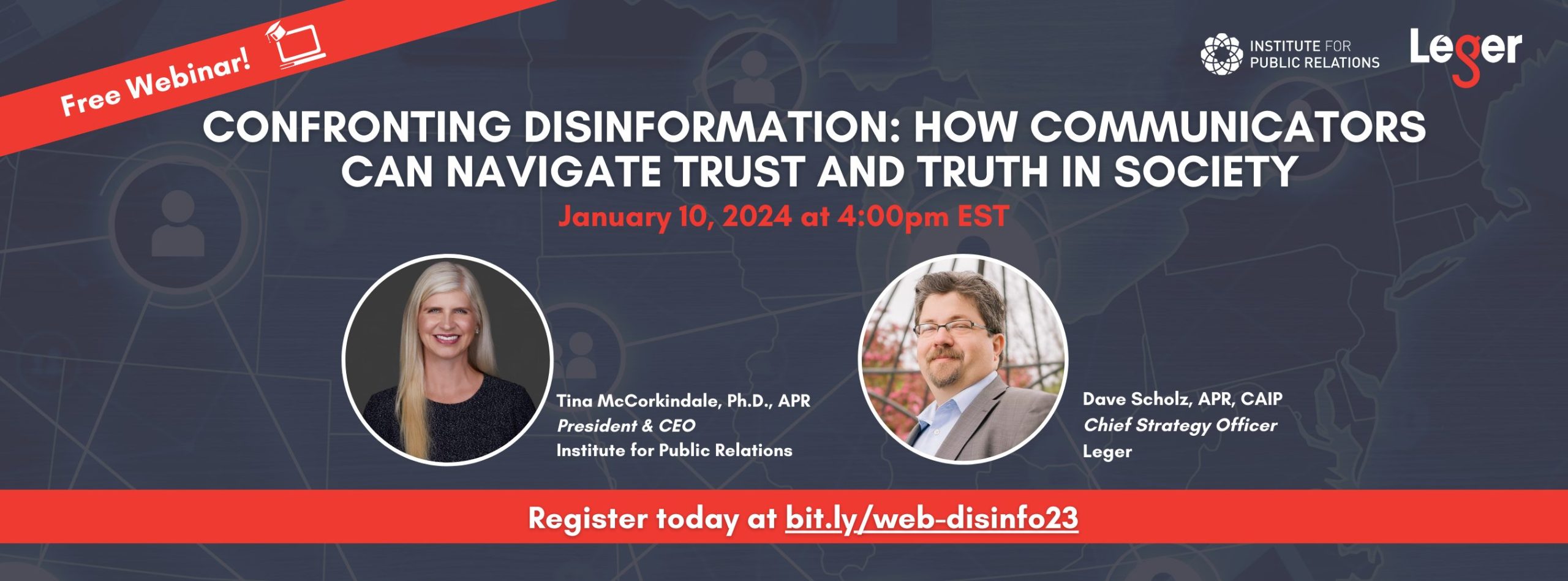Download Full Report (PDF): Full 2023 Disinformation in Society Report
Download Press Release: 2023 Disinformation Report Press Release
Download Social Graphics: Disinformation in Society Report Graphics

Introduction
In this 4th annual disinformation study, the Institute for Public Relations and Leger surveyed 2,002 Americans about their perceptions of the impact of disinformation in society. Our results found that the American socio-political landscape has been increasingly clouded by concerns over misinformation and disinformation, with both perceived as more pressing threats than critical issues such as border security, climate change, and terrorism.Full Report:
SOME OF THE KEY FINDINGS INCLUDE:
Compared to 2021, in 2023 most Americans still consider misinformation and disinformation to be major problems. These were considered to be a larger issue than border security (57%), the budget deficit (56%), climate change (55%), domestic terrorism (44%), and international (43%) terrorism. The top three issues considered to be major problems facing Americans are inflation (73%), health care costs (72%), and crime (71%). Gun violence concerns jumped 8 percentage points (pp) from 60% in 2021 to 68% in 2023.
Misinformation and disinformation continues to adversely affect the trust Americans put in the election process, as well as on society as a whole. Most Americans believe disinformation undermines our election process (75%), is a threat to our democracy (74%), increases the polarization of political parties (73%), and infringes on human rights (61%). Additionally, more than half (55%) said artificial intelligence platforms will create more disinformation in society. While the proportion who feel anxious or stressed when encountering disinformation slightly decreased from 2021 (47% vs. 52% in 2021), more Americans disagree that concerns about disinformation are exaggerated (up 5pp from 2021).
Local news sources help bridge the trust gap of sources between Democrats and Republicans. As expected, sources considered more liberal were rated more trustworthy by Democrats, and more conservative sources were rated more trustworthy by Republicans. Democrats were also more likely to trust journalists overall. Nevertheless, they do agree on local news sources as being one of the most trustworthy sources for accurate news and information.
Social media, politicians of the opposing party and political activist groups, along with the Chinese and Russian governments are the top offenders believed to be responsible for spreading disinformation to the public. Facebook (73%), Tik Tok (65%), and X (formerly Twitter) (62%) are the top three social media platforms seen as being at least “somewhat” responsible for spreading disinformation. While around 3-in-4 members of either political party believe the senators and representatives of the opposing party were at least ‘somewhat’ responsible for disinformation, around 2-in-5 respondents say their own party’s members are responsible for spreading disinformation (43% of Democrats and 45% of Republicans).
While most Americans feel some sources are doing at least “somewhat well” in combatting disinformation, those seen as being most responsible are falling severely short on execution. 60% said President Biden should be “very responsible” for combatting disinformation, but only 15% said he was doing so “very well.” Similarly, 52% continue to say former President Donald Trump should be “very responsible” for combatting disinformation, but only 16% said he was doing “very well” in combatting it. Additional gaps were found with entities who scored the highest in responsibility for combatting disinformation, including the U.S. government (62% vs. 12%), Congress (58% vs. 8%), and journalists (58% vs. 12%).
About the Institute for Public Relations
Founded in 1956, the Institute for Public Relations is an independent, nonprofit foundation dedicated to the science beneath the art of public relations™. IPR creates, curates, and promotes research and initiatives that empower professionals with actionable insights and intelligence they can put to immediate use. IPR predicts and analyzes global factors transforming the profession and amplifies and engages the profession globally through thought leadership and programming. All research is available free at www.instituteforpr.org and provides the basis for IPR’s professional conferences and events.
About Leger
Leger is the largest Canadian-owned market research and analytics company, with more than 600 employees in eight Canadian and US offices. Leger has been working with prestigious clients since 1986. For more information visit leger360.com.
Media Contact:
Brittany Higginbotham
Communications & Digital Specialist
brittany@instituteforpr.org
352-392-0280




